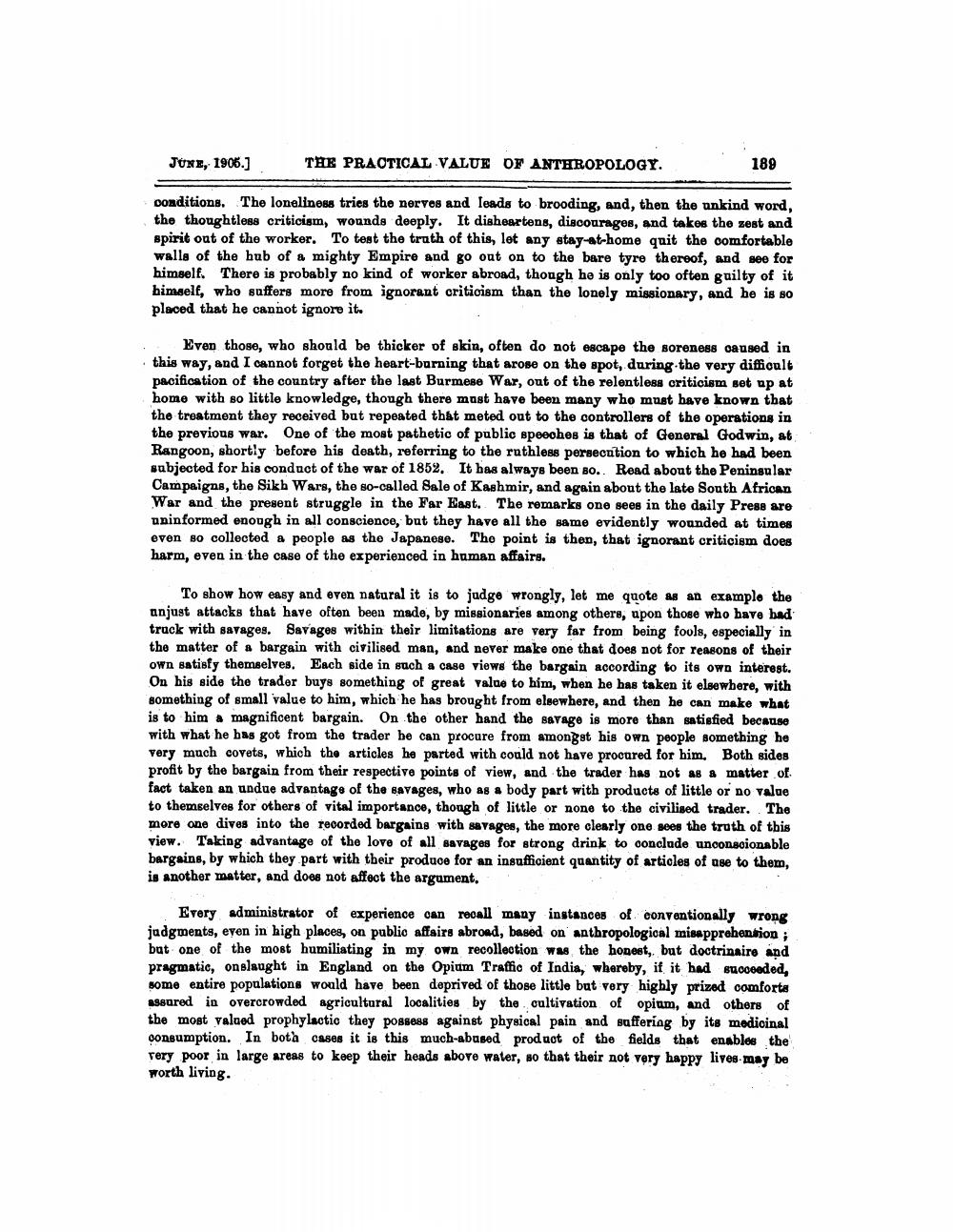________________
JUNE, 1906.]
THE PRACTICAL VALUE OF ANTHROPOLOGY.
189
conditions. The loneliness tries the nerves and leads to brooding, and, then the unkind word, the thoughtless criticism, wounds deeply. It disheartens, discourages, and takes the zest and spirit out of the worker. To test the truth of this, let any stay-at-home quit the comfortable walls of the hub of a mighty Empire and go out on to the bare tyre thereof, and see for himself. There is probably no kind of worker abroad, though he is only too often guilty of it himself, who suffers more from ignorant criticism than the lonely missionary, and he is so placed that he cannot ignore it.
Even those, who should be thicker of skin, often do not escape the soreness caused in this way, and I cannot forget the heart-burning that arose on the spot, during the very difficult pacification of the country after the last Burmese War, out of the relentless criticism set up at home with so little knowledge, though there must have been many who must have known that the treatment they received but repeated that meted out to the controllers of the operations in the previous war. One of the most pathetic of public speeches is that of General Godwin, at Rangoon, shortly before his death, referring to the ruthless persecution to which he had been subjected for his conduct of the war of 1852. It has always been bo.. Read about the Peninsular Campaigns, the Sikh Wars, the so-called sale of Kashmir, and again about the late South African War and the present struggle in the Far East. The remarks one sees in the daily Prese are uninformed enough in all conscience, but they have all the same evidently wounded at times even so collected a people as the Japanese. The point is then, that ignorant criticism does harm, even in the case of the experienced in human affairs.
To show how easy and even natural it is to judge wrongly, let me quote As an examplo the anjust attacks that have often been made, by missionaries among others, upon those who have had truck with savages. Savages within their limitations are very far from being fools, especially in the matter of a bargain with civilised man, and never make one that does not for reasons of their own satisfy themselves. Each side in such a case views the bargain according to its own interest. On his side the trader buys something of great value to him, when he has taken it elsewhere, with something of small value to him, which he has brought from elsewhere, and then he can make what is to him a magnificent bargain. On the other hand the savage is more than satisfied because with what he has got from the trader he can procure from amongst his own people something he very much covets, which the articles he parted with could not have procured for him. Both sides profit by the bargain from their respective points of view, and the trader has not as a matter of fact taken an undue advantage of the savages, who as a body part with products of little or no value to themselves for others of vital importance, though of little or none to the civilised trader. The more one dives into the recorded bargains with sevages, the more clearly one sees the truth of this view. Taking advantage of the love of all savages for strong drink to conclude unoonacionable bargains, by which they part with their produce for an insufficient quantity of articles of use to them, is another matter, and does not affect the argument.
Every administrator of experience can recall many instances of conventionally wrong judgments, even in high places, on public affairs abroad, based on anthropological misapprehension ; but one of the most humiliating in my own recollection was the honest, but doctrinaire and pragmatic, onslaught in England on the Opium Traffic of India, whereby, if it had succeeded, some entire populations would have been deprived of those little but very highly prized comforts assured in overcrowded agricultural localities by the cultivation of opium, and others of the most valued prophylactic they possess against physical pain and suffering by its medicinal consumption. In both cases it is this much-abused product of the fields that enables the very poor in large areas to keep their heads above water, so that their not very happy lives may be worth living.




